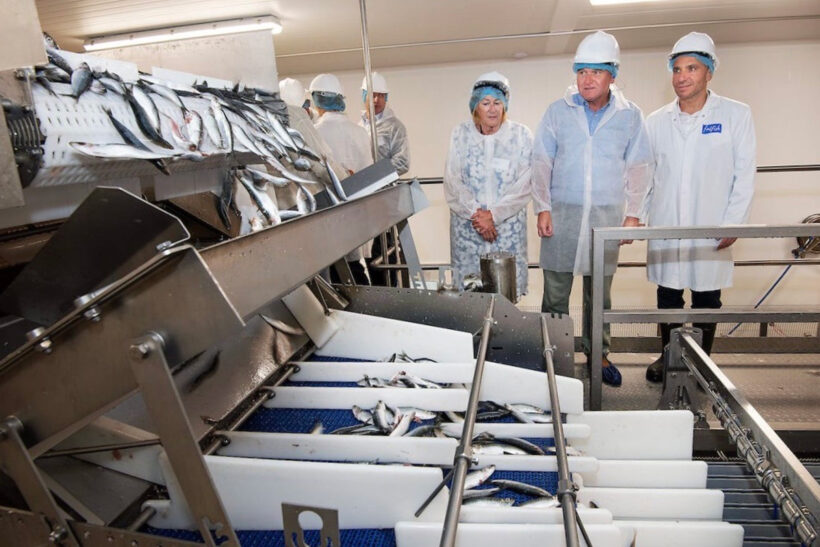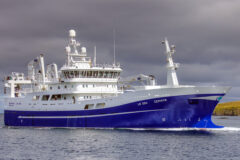£12.8m investment by Morrisons builds on the continuing success of resurgent sardine fishery in Cornwall
By Harry Owen
In 2007, the Pilchard was rebranded as the Cornish sardine, and ever since, the fishery and the processing industry it supports have been on an upwards trajectory, with a new state of the art processing facility being opened in Redruth last week.
Falfish, which is owned by Morrisons, opened the £12.8m Falfish Freezing Centre with the help of £3.8, from the UK Seafood Fund. It is one of around 200 beneficiaries of the fund across the UK. James Adam Pace, head of fisheries funding at Defra, said that the project ‘will support and achieve one of the grant’s key aims – to support the long-term future and sustainability of the UK seafood sector’.
The new freezing centre, which is the largest individual quick frozen facility in the UK, is capable of processing 180t of fish per day – equivalent to nine full trucks – whilst maintaining pristine catch quality. In fact, the facility has cut processing time fourfold, to the point where the sardine goes from swimming in the sea to a product individually frozen and ready for sale in only eight hours.
The facility includes a nitrogen tunnel capable of handling 112,000 fish an hour, which will reduce the processing time to 40 minutes. Morrisons says that the production process ‘has an innovative hot gas defrost system and green refrigerant with zero global warming potential to ensure it is economical, environmentally friendly to run and helps Morrisons to achieve its target of net zero operational emissions by 2035’.
Sam Lambourn, a pioneer of the sardine fishery in Cornwall, explained at the opening ceremony that it all began with Falfish in the early 2000s. Having regularly passed over shoals of sardines heading out to his traditional fishing grounds, Sam approached Falfish, and by 2004, it had invested in the infrastructure necessary to support the new fishery. Things then took off; in 2010, the fishery received MSC certification, by 2023 7,000t were landed to Falfish, and this July has seen record landings from the Cornish fleet.
Richard Caslake, chair of the Cornish Sardine Management Association, which sets catch limits and manages the fishery, said: “The new facility is a fantastic opportunity for those vessels landing to Morrisons. The Cornish sardine is an underutilised stock with a biomass currently approaching 400,000t, and this facility will the city has a robust offering that fills the needs of its stakeholders and retains an important cultural aspect of the city for future generations to enjoy.”
The study will examine multiple options for the operation of a new market, including the legal set-up, the potential for Plymouth to act as a ‘satellite’ auction in partnership with an existing fish auction elsewhere, and the potential for additional services to generate extra income, be this from the general public or commercial users.
The business plan is expected to include a detailed look at capital costs, the costs of new infrastructure, cashflow issues, and the likely throughput of fish through a new Plymouth market, after discussion with give vessels the opportunity to optimise their catches and its market price, all while bolstering national food security.”
James Adam Pace said that the new factory ‘will have an incredible impact on Falfish’s capacity to process fish, cut carbon emissions and ultimately drive economic growth in the local area’. He added: “What’s more, it shows that economic growth and cutting carbon emissions towards net zero are two things that you can do at the same time, and are not mutually exclusive.”
Chris Blamey, who fishes off the coast of Mevagissey, told the BBC that he hoped the new freezing centre would ‘dramatically improve’ his bottom line.
“On a typical night a year ago we might have been told to only catch 8t, as that’s all the factory could handle, but now they might say we can catch 15t,” he said.
This story was taken from the latest issue of Fishing News. For more up-to-date and in-depth reports on the UK and Irish commercial fishing sector, subscribe to Fishing News here or buy the latest single issue for just £3.30 here.
Sign up to Fishing News’ FREE e-newsletter here.






